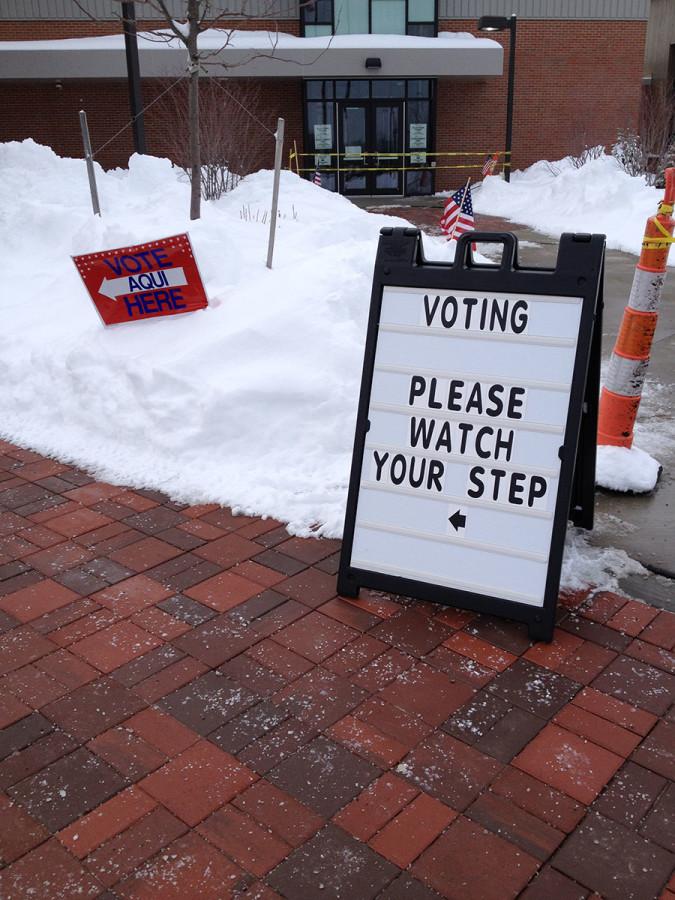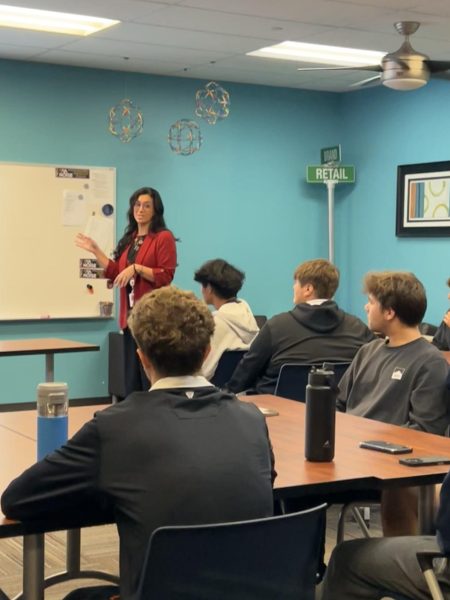Beachwood Voters Narrowly Defeat Term Limit Amendment
No one said it would be easy.
The campaign to enact a term limit charter amendment in the City of Beachwood began in the summer of 2014 and ended with a special election on Feb. 3.
The movement could be called many things: a quixotic, wasteful quest to make change for change’s sake or a necessary, underdog fight to unseat entrenched power. But no one could say it was a walk in the park.
Ultimately, the ballot issue failed, but the election was close. According to results from the Cuyahoga County Board of Elections, 48.1% of voters cast ballots for term limits and 51.9% voted against, a difference of a mere 53 votes.
The amendment, which proposed a limit of three four-year terms or fourteen consecutive years on all elected city officials, weathered politics at its thorniest. It survived two attempts to get it to the ballot box, questions about its constitutionality, a controversy about the opposition’s political advertising and numerous other challenges. Its story demonstrates both the nature of the politics in Beachwood and the process of enacting political change.
A Genesis of an Idea
Bryan Byrne, spokesman for the amendment and one of its petitioners, said he wasn’t too involved in city politics until it came to his front door, literally.
“I lived across the street from Beachwood [Place],” he said. “With the rezoning of the mall, there were certain things that were going to impact me and my family, and I didn’t think our needs were being remotely addressed. So I [became] more involved in city politics.”
Upon further investigation, he felt that there were many issues about which citizens felt strongly and to which council was not responding.
“You talk to people in the city and 99% are against what’s going on, but local city [officials are] more interested in serving the needs of their long term contributors,” he said.
The 99% figure is hyperbolic, but the dissatisfaction Byrne and his fellow petitioners felt was not.
“The [dissatisfaction over the] rezoning [of the] mall brought together a lot of people who had a lot of different concerns, and that was where the movement started,” Byrne said.
Of course, it should be noted that nowhere near 99% of Beachwood feels the kind of dissatisfaction Byrne is describing.
“I think it’s absurd,” said 40-year Beachwood resident Richard Rosner, who voted against the term limit amendment and felt it violated Ohio’s constitution.
Even those who voted in favor of term limits still did not necessarily feel the anger and discontent with the City that Byrne described.
“We think the city is ready for change and new blood and new ideas and ready to move forward,” said voter Lindsey Miller, speaking for her and her husband. She voted in favor of term limits on election day. “Not that there’s anything wrong with it. Beachwood’s obviously fantastic.”
But dissatisfied residents were not going to sit idly as the city moved in a direction they did not like. They decided on term limits as a means of changing Beachwood’s political structure.
Earlier in his life, Byrne served in the air force, and as a result, lived in many cities across the nation. His experience with a variety of city governments convinced him of the merit of term limits.
“The cities that had term limits seemed to have a more vibrant base that didn’t seem to be stuck in the old ways,” he said.
Byrne felt term limits were especially necessary in Beachwood.
“Term limits [are] more about creating opportunities for people to run. Even with the last elections, city council ran as a pack of three. The incumbents put up a barrier that makes it incredibly difficult for new people to run,” Byrne said.
“The world is changing. It’s not that there’s no place for [older people]. [But there should be some younger voices]. Being mayor is not a career … It’s not supposed to be,” said Max Bleich, a recent BHS graduate and University of Cincinnati freshman. Bleich was one of the original five petitioners for the July 31 petition.
From Idea to Ballot Box
The only way to make term limits a part of the Beachwood charter, equivalent to the city’s constitution, is to take the issue to the voters, Beachwood law director Brian Reali said.
For a petition to become a ballot issue, it must be signed by five petitioners and vetted by the Cuyahoga County Board of Elections. Then, the petitioners must gain signatures from about 10% of Beachwood registered voters who voted in the last general election, according to the Board of Elections.
Byrne and the other petitioners attempted to gather enough signatures so that the ballot could be voted on during the November election. However, they did not obtain enough valid signatures on the approved ballot language in time.
But they did not give up. They mustered the necessary number of signatures to call for a special election in February.
Opting for a February election meant the petitioners would risk lower turnout, Cleveland State University political science professor Joel Lieske said.
“If it’s a special election, they’re going to bring out the most attentive people in the community … those who have some financial connection with the city … or the ones who have the greatest interest in what local government is doing,” he said.
According to cleveland.com, the election cost the city $23,000. Reali said this money was used for informational fliers the city is required to send. Additionally, the city had to pay the Board of Elections to hold the special election.
This money comes from the general fund, or the taxpayers, Reali said.
The Campaign
With the election date set for Feb. 3, the campaign could begin in earnest.
The battle lines were quickly drawn. Many Beachwood elected officials came out against term limits with public statements, including Council President Fred Goodman, City Council Members James Pasch and Alec Isaacson and School Board President Mitch Luxenberg.
“I believe there is already a democratic process in place, and people can either vote people in or out; it’s called an election,” Goodman said. “Good government is not always easy to find.”
“We are a very small community,” he added. “There are only so many people who are willing to run for office. I think you always need the largest choice [of candidates], and term limits don’t allow for that.”
Goodman also noted that four out of the seven council members were not running for reelection next year, making “fresh faces” inevitable.
Voters on the day of the election were divided.
“My husband and I are both from Beachwood and moved back here, and we’re a young family. So we’re ready for change and some fresh blood and some fresh ideas,” said Miller. “We’ve seen the same people since we were growing up in town.”
“I weighed the issue, and I feel that if I don’t want to see someone in that office, I would vote against the candidate. So it doesn’t make any difference about the term limits,” said Charlotte Rubin, a 20-year Beachwood resident.
One particular bone of contention was whether the amendment was constitutional. The controversy revolved around the retroactive nature of the term limits. This means that the time elected officials have already served would be counted against them. For example, someone like councilman Goodman, who has served for 22 years, would not be eligible for another three terms.
“The Ohio Supreme Court has already ruled on a very similar case in Cincinnati and said that a retroactive term limit violates the constitution,” Reali said.
Reali is referring to the Ohio Supreme Court case State Ex Rel. Mirlisena v. Hamilton County Board of Elections. In this case, justices ruled that a ballot measure which imposed retroactive term limits on Cincinnati council members was unconstitutional. While the amendment did allow council members who had already served over the allotted time to complete their terms, the justices felt it violated the part of the Ohio Constitution which forbids retroactive laws.
Lieske agreed that such a retroactive term limit would not be constitutional.
“We have reviewed that case, and we believe [Reali] is applying it inappropriately,” Byrne said, referring to statements Reali has made against the constitutionality of the amendment. “If we believe that it was unconstitutional we would not have brought the amendment forward because then it [would] be a waste of time.”
Byrne took particular umbrage that Reali publically questioned the amendment’s constitutionality. “Brian Reali is an attorney. He is not a judge. He is not a jury. It is inappropriate for him to declare something unconstitutional,” Byrne said.
In fact, the issue of what exactly was appropriate for Reali to say became a sub-issue in it of itself. In the “Council Update” section of the January edition of Beachwood Buzz, Reali wrote a Q&A bulletin about the election that was supposed to provide factual information.
However, Byrne wrote in a comment to cleveland.com that the bulletin read more like an advertisement than an objective bulletin. What was particularly controversial was a statement in the bulletin where Reali stated he “did research” and deemed the retroactive nature of the amendment “illegal” and “unconstitutional.”
According to Ohio law, it is illegal to spend tax dollars on political advertising.
“Voters need to understand that this is [a] political advertisement against something paid for with public dollars. This is absolutely outrageous,” Catherine Turcer of Common Cause Ohio told cleveland.com about the Beachwood Buzz bulletin. “When things are on the ballot, the city cannot participate in this type of way.”
“It was an inappropriate use of taxpayer dollars to inappropriately influence the outcome of an election,” Byrne said.
“Of course it was biased. That’s not so much the issue. The issue is they used city money to do it. Political agenda should not be paid for by the city,” Bleich said.
Councilman Martin Horwitz and Pasch both told cleveland.com they were not behind The Beachwood Buzz update, nor did they approve of it.
Reali said he did not violate any law.
“I can tell you it’s completely legal. We checked the code of law before. Everyone doesn’t have to agree with our opinion; that’s fine,” he said.
“The people want information. We thought this was a convenient way to give out information,” Reali added.
A loss, but not a defeat
Feb. 3 had finally arrived. After all the canvassing, controversies and commentary, Byrne and his fellow petitioners were hit with a loss, but Byrne was not discouraged.
“It sends a clear message to city hall that nearly half the population of city of Beachwood is not content with the way things are running right now,” he said.
“I think a lot of people are getting [more involved] in city politics and seeing what’s going on … and that can only be viewed as a good thing,” he added.
While Byrne said he is not planning on trying to bring the amendment to the polls again, Lieske said there could be a chance of victory during a November election.
“They might give it a try again because it came close,” Lieske said. “If the ballot issue was [during] the regular election when you’re going to have a bigger turnout than in a special election, that might increase the odds of passing it.”
While the road to the Feb. election was a rocky one, Byrne is proud of what he and the other petitioners accomplished.
“Of course I would have wanted to have won, [but three years ago,] I would not have even gotten enough signatures to get it on the ballot,” Byrne said. “The fact that I got it on the ballot, we ran out a campaign, and literally came 50 votes away from winning, I felt pretty proud.”





![“My parents have always said that education is important. My parents are Chinese immigrants, I'm Chinese American, [and that's a] value that has always been ingrained in our community,” said Senior Lyndia Zheng, pictured with Tony Zheng](https://bcomber.org/wp-content/uploads/2025/10/DSC_4244-600x400.jpg)






